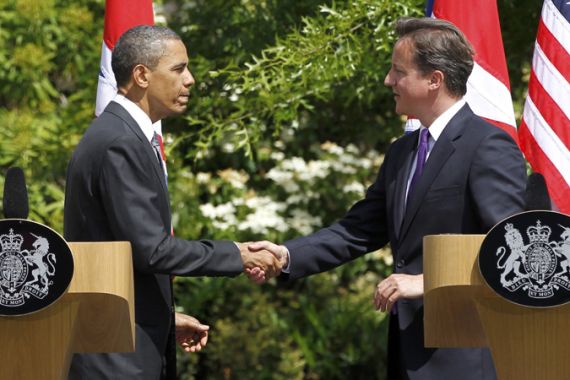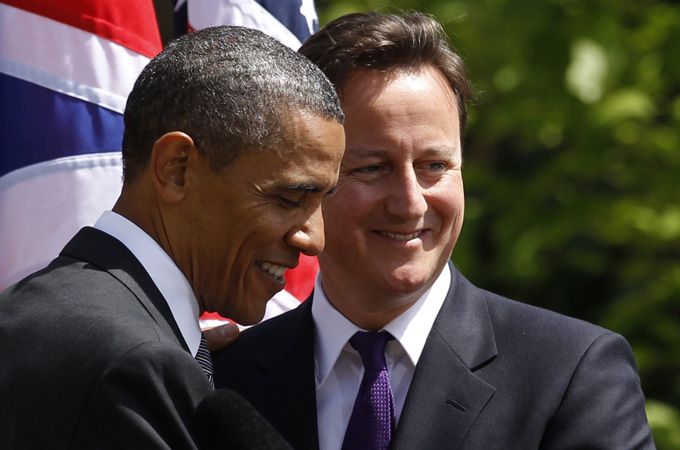US and UK vow ‘no let-up’ on Gaddafi
Allies say Libyan leader will ultimately be made to step down by sustained NATO operations.

 |
| Obama, left, is in the UK as part of a six-day European tour [Reuters] |
Britain and the US have promised no “let-up” in an international military campaign aimed at pressuring Muammar Gaddafi, the Libyan leader, to step down.
Speaking at a joint press conference in London on Wednesday, Barack Obama, the US president, and David Cameron, the British prime minister, reiterated calls for Gaddafi to go.
“I believe that we have built enough momentum that as long as we sustain the course we’re on, he will step down,” Obama said.
“Ultimately this is going to be a slow, steady process in which we’re able to wear down the regime forces.”
Libya has been wracked with conflict for months as Gaddafi seeks to crush an uprising against his 41-year rule.
European and US forces mounted air raids on Libya on March 19 after the UN Security Council authorised “all necessary measures” to protect civilians from Gaddafi’s forces.
The US president, in the UK as part of a six-day European tour, ruled out a deadline for ending the US role in Libya, saying the mission would end in a timely fashion.
Cameron backed Obama, saying: “I absolutely agree that given the progress that has been made over the last several weeks that Gaddafi and his regime need to understand that there will not be a let-up in the pressure that we are applying.”
He said he believed Gaddafi was “ultimately going to step down”.
‘Under pressure’
Their comments come amid complaints among some NATO countries about the reduced US role in the Libya operation since NATO took over command.
|
Many of those fighting pro-Gaddafi forces in Libya are volunteers, Al Jazeera’s Mike Hanna reports |
Legislators in Britain and France have complained that their nations are shouldering an unfair burden in the Libya campaign, particularly at a time when budget cuts have hit defence spending.
But earlier in the day, William Hague, the UK foreign secretary, dismissed suggestions that Britain was among the countries upset about the US contribution to the mission.
Speaking to the BBC, he said he had “no criticism” of his American allies.
In the opposition-held Libyan city of Benghazi, Mike Hanna, Al Jazeera’s correspondent, noted that military pressure from NATO was unlikely to be enough to force Gaddafi to step down.
“The political element to this is also very important and there is an awareness here in Benghazi, among many of the opposition leaders, that in the end the military strategy will not be enough to get rid of Gaddafi,” he said.
“There is going to have to be a political component to all this as well, both internally, but very importantly externally as well.”
Palestinian statehood
Obama also used the London press conference with Cameron to deliver his most direct criticism to date of Palestinian efforts for national recognition at the United Nations, calling the move a “mistake”.
He said that a two-state solution was achievable but urged the Palestinians to talk to Israel over statehood rather than seeking UN recognition.
The question of Middle East peace exposed some disagreement between the allies.
Cameron said he strongly supported Obama’s recent speech in which the president explicitly endorsed a return to Israel’s pre-1967 borders, along with mutually agreed-to land swaps, as the starting point for peace talks with Palestinians.
But on the Palestinian bid for recognition at the UN the leaders are more divided, and the British prime minister declined to commit himself one way or the other.
“We don’t believe that the time for making a decision on the UN resolution – there isn’t even one there at the moment – is right yet,” Cameron said.
“We want to discuss this within the European Union and try to maximise the leverage and pressure the European Union can bring on both sides to get this vital process moving.”